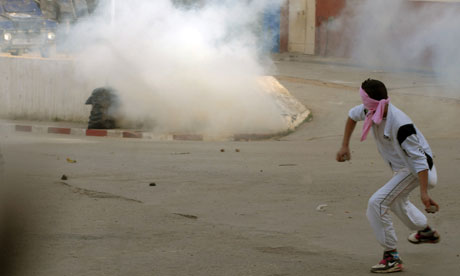
After several days of rioting earlier this month, the Algerian government decided to cut the cost of some staple foods, such as sugar, cooking oil and flour. It also said that import duties on sugar, cooking oil and other foodstuffs will be reduced.
This will cost the treasury 23bn dinars (£193m) in lost customs duty, but it is only for a period of eight months – and while the situation is calm now, there will be more trouble if prices are increased again.
The recent rioting has many of the hallmarks of the 1988 "bread revolt". The difference between now and then is that in 1988, Algeria was heavily in debt and now it is a rich country with bank reserves of $160bn, thanks to oil and gas revenue. But people are not benefiting from huge gas and oil revenues. .
A few weeks ago, there were protests in Algiers about social housing. The government promised to build more homes, but this will take many years to do.
Last November, the authorities issued statements through the press to the fact that prices of essential goods would increase and that tax would be levied on the wholesale companies. This, in turn, forced the wholesale companies to increase the cost of all foodstuffs.
What is amazing is that the government planned this increase several months ago and the regime seems to be out of touch with the grassroots. The regime simply wanted to control the lives of people in its own way.
On 11 January, several political parties, independent trade unions and important personalities appealed to the government to lift the state of emergency and allow more political and press freedom and the establishment of associations of civil societies. They said the latest revolt was "clearly a failure of the last 50 years of the government". The interior minister, Daho Ould Kablia, accused the signatories of being irresponsible.
This latest revolt had been expected since the presidential election of April 2009, which Abdelaziz Bouteflika won with 90.25%, despite a massive boycott by the electorate. As a result, there was a complete breakdown in trust between politicians and citizens. Many of this ruling elite have been in power since independence, while many of the new highly qualified elite have left the country.
With very high unemployment, particularly among the young and university graduates, the cost of living doubling within a few weeks, uncontrolled inflation and a political situation that is completely blocked, many Algerians have given up hope and would pay any price to join smugglers' boats to Europe.
Since September 2009, rumours began to spread about Bouteflika's health and new elections. Many observers noticed that Boutaflika no longer seems to control events in the country. His health remains a state secret and this has caused many Algerians to worry about the future.
The personal ambition of Said Bouteflika to succeed his brother as president has increased unhappiness among Algerians. Other political leaders who want to succeed Bouteflika are: Abdelaziz Belkhadem, a hardliner and secretary-general of the ruling FLN party, and Ahmed Ouyahia, the present prime minister, who is been seen by European and US diplomats as the best technocrat.
Since Bouteflika became president in 1999, he has not introduced any measures that might improve the freedom of assembly, of the press, or the protection of human rights. Any democratic transformation of the country was prevented by his obsession with maintaining control by the use of classical socialist ideological methods imposed by the late president Houari Boumédienne.
Algerian political parties are ideologically split over fundamental reforms. Those in favour are too weak to implement any change. Civil society is not allowed to flourish. The ruling elite pays no attention to people's wellbeing and thinks the leadership has been elected to last for ever.
Last June, Bouteflika appointed a new cabinet and for the first time he created a new post of deputy prime minister for his old friend, Noureddine Yazid Zerhouni, who was the interior minister before the reshuffle.
However, last September, according to my sources, Zerhouni asked Bouteflika to consider an early retirement (friendly advice, one would think). Next day, he was told not to come to the Council of Ministers meeting and since then has not been seen around the president.
What will Bouteflika do now? Aged 74 and in poor health, is he capable of taking decisions and the country forward, given the struggle for succession within his cabinet? During the last protest, Algerians were demanding more respect, jobs, freedom and no more of the iron fist.
The regime has succeeded in calming the situation for now, but without serious reforms, for how long? There remains the risk that trouble will begin again – especially in view of the uprising in Tunisia next door.
No comments:
Post a Comment